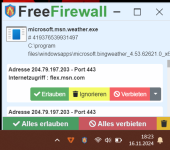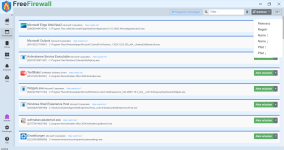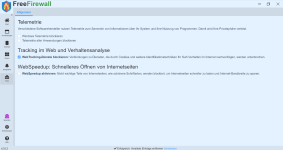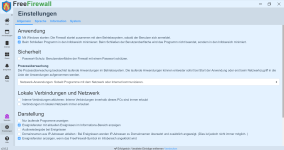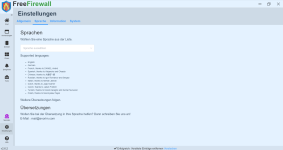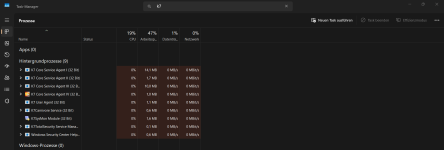I did not find a review yet, apart from a discussion on the title giving product, so I decided to introduce it to you, as I believe it is a worthy addition on any existing security solution you have in order.
My review is based on combining named software firewall with Huorong Internet Security (which brings it's own firewall module, which acts excactly like that one, once activated and properly configured), F-Secure Total and (again now) with K7 Total Security, which includes a - unfortunately crippled - firewall (it by default auto-allows everything without notice, and once set to "prompt for action", it still autodecides to allow trusted services - not acceptable for a paranoid user like me).
According to the developer, it is compatible to other firewall products, which I can fully confirm. It does not touch the integrated Windows firewall, which by default only affects inbound traffic (AFAIK), but does not have any option to let the user decide which outbound connections he wishes to interfere. That's when Evorim Free Firewall comes handy.
Once set to "Active" (by default, it is off), it will notify you on most (if not all) outbound connections a service attempts. This also includes (usually trustable / trusted) Windows services, which also can be a target of malware - most common and hard to block by many AV softwares I tried are wscript / cscript. It ALSO doesn't get tricked by changing the underlying .exe; it will again notify you then, as it detects it as a new service, regardless of same name. Be aware once you decide to allow or block the service, it will put it to the respective list. You can of course change the entries any time, and also have the option to clear the list of dead entries.
There are also options like "Gaming" (which will most likely block the service without the notification window bottom right, see screenshots later), and to block everything.
You can filter either for applications or for services; I use to work with first named. You might also set up zones (it works as a blueprint for network rules, I did not try it though, you might refer to the manual if needed).
I did not find any entry in "events" section, however, I'm happy for.
If you don't wish to send telemetry to M$ (or even every application), you also have the option to filter it, however I did not try it yet, afraid of breaking something. What I did activate however is the connection to web tracking services. It did not worsen with my browsing experience yet. I did not activate WebSpeedup, which is meant to speed up website loading and to save data, but for the good of style - not sure whether we need that nowadays.
The most important setting lies in "settings" - which is the option to boot up the firewall with Windows. There is no reason to not do it, regardless of M$ Task Manager telling me it has high influence on boot time, it does not feel like at all, tested on newer and older machines. See screenshot as well.
Also, the RAM usage is quite low, only being beaten by K7 Total Security (in idle mode, just having the Firewall window open for taking screenshots).
What I cannot confirm by 100%, but it seems so when I tried it with Solitaire (which does have internet related functions and instantly tries calling out on opening) - with the Firewall being terminated, it might occur that outbound connections get intercepted, because it cannot ask or check whether a program is allowed to call out.
According to the log, the last issue of Evorim Firewall has been released in September 2022, but I do not have the feeling something is missing. At least the owner states the software is not abandoned yet, however, I cannot double check that of course. No idea whether it needs a portable version he seems to work on (one or more German developer(s).
I'm proud to be able to tell that not a single malware process managed to slip through without notification when I tested malware myself (at least I didn't notice in TCPView; if it hollowed a already whitelisted process, then yes). However, I'm willing to see any test which proves the opposite, and of course, no security software is 100% bulletproof, the protection improves by combination.
Feel free to give the software a spin, it's free, and it works like a charm to my experience, have been using it for years now, and the range of software firewalls is sadly limited, and not all AVs bring their own. It comes in multiple languages as shown on the screenshot, and autodetects the system language.
The product is beginner friendly, however you should not blindly click the notifications, which will bombard you on first run and until all processes are given a rating (allow / disallow).
It will run from Windows 7 upwards, also on Windows Server 2008, 2012, 2016, 2019.
It requires 512 MB RAM, 2 Ghz CPU, 400 MB HDD.
These according to the official website.
Linux and MacOS are planned, it will be crowdfunded.
My review is based on combining named software firewall with Huorong Internet Security (which brings it's own firewall module, which acts excactly like that one, once activated and properly configured), F-Secure Total and (again now) with K7 Total Security, which includes a - unfortunately crippled - firewall (it by default auto-allows everything without notice, and once set to "prompt for action", it still autodecides to allow trusted services - not acceptable for a paranoid user like me).
According to the developer, it is compatible to other firewall products, which I can fully confirm. It does not touch the integrated Windows firewall, which by default only affects inbound traffic (AFAIK), but does not have any option to let the user decide which outbound connections he wishes to interfere. That's when Evorim Free Firewall comes handy.
Once set to "Active" (by default, it is off), it will notify you on most (if not all) outbound connections a service attempts. This also includes (usually trustable / trusted) Windows services, which also can be a target of malware - most common and hard to block by many AV softwares I tried are wscript / cscript. It ALSO doesn't get tricked by changing the underlying .exe; it will again notify you then, as it detects it as a new service, regardless of same name. Be aware once you decide to allow or block the service, it will put it to the respective list. You can of course change the entries any time, and also have the option to clear the list of dead entries.
There are also options like "Gaming" (which will most likely block the service without the notification window bottom right, see screenshots later), and to block everything.
You can filter either for applications or for services; I use to work with first named. You might also set up zones (it works as a blueprint for network rules, I did not try it though, you might refer to the manual if needed).
I did not find any entry in "events" section, however, I'm happy for.
If you don't wish to send telemetry to M$ (or even every application), you also have the option to filter it, however I did not try it yet, afraid of breaking something. What I did activate however is the connection to web tracking services. It did not worsen with my browsing experience yet. I did not activate WebSpeedup, which is meant to speed up website loading and to save data, but for the good of style - not sure whether we need that nowadays.
The most important setting lies in "settings" - which is the option to boot up the firewall with Windows. There is no reason to not do it, regardless of M$ Task Manager telling me it has high influence on boot time, it does not feel like at all, tested on newer and older machines. See screenshot as well.
Also, the RAM usage is quite low, only being beaten by K7 Total Security (in idle mode, just having the Firewall window open for taking screenshots).
What I cannot confirm by 100%, but it seems so when I tried it with Solitaire (which does have internet related functions and instantly tries calling out on opening) - with the Firewall being terminated, it might occur that outbound connections get intercepted, because it cannot ask or check whether a program is allowed to call out.
According to the log, the last issue of Evorim Firewall has been released in September 2022, but I do not have the feeling something is missing. At least the owner states the software is not abandoned yet, however, I cannot double check that of course. No idea whether it needs a portable version he seems to work on (one or more German developer(s).
I'm proud to be able to tell that not a single malware process managed to slip through without notification when I tested malware myself (at least I didn't notice in TCPView; if it hollowed a already whitelisted process, then yes). However, I'm willing to see any test which proves the opposite, and of course, no security software is 100% bulletproof, the protection improves by combination.
Feel free to give the software a spin, it's free, and it works like a charm to my experience, have been using it for years now, and the range of software firewalls is sadly limited, and not all AVs bring their own. It comes in multiple languages as shown on the screenshot, and autodetects the system language.
The product is beginner friendly, however you should not blindly click the notifications, which will bombard you on first run and until all processes are given a rating (allow / disallow).
It will run from Windows 7 upwards, also on Windows Server 2008, 2012, 2016, 2019.
It requires 512 MB RAM, 2 Ghz CPU, 400 MB HDD.
These according to the official website.
Linux and MacOS are planned, it will be crowdfunded.


